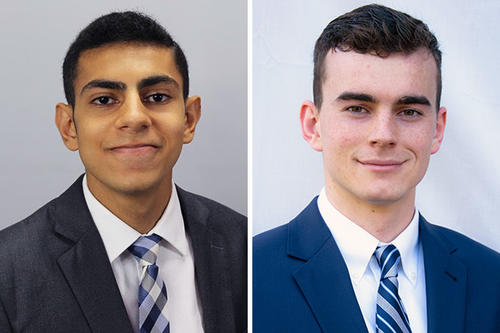
Two students in the College of Science and Engineering (CSE) at the University of Minnesota Twin Cities have been awarded scholarships for the 2020-21 academic year by the Astronaut Scholarship Foundation. The prestigious, competitive scholarship, initiated by the Mercury-7 astronauts, is awarded annually to outstanding sophomores and juniors who intend to pursue research-oriented careers in mathematics, engineering, and the natural and applied sciences.
The scholarship awards up to $10,000 for a year of undergraduate study. In addition, recipients will receive mentoring and professional development support, attend the Astronaut Foundation’s Innovators Gala in Washington D.C. and have the opportunity to participate in other Astronaut Foundation events.
Marcos Zachary is a biomedical engineering major from Inver Grove Heights. He has been studying the mechanobiology of lung fibroblasts with Victor Barocas, a professor of biomedical engineering in CSE, and Peter Bitterman, a professor in the Medical School and a member of the Masonic Cancer Center. Zachary plans to complete graduate degrees in medicine and engineering to pursue research in computational medicine.
Born in Libya, Zachary and his parents fled the country following the overthrow of Muammar al-Gaddafi in 2011. He arrived in Minnesota as a 10-year-old child with limited English and taught himself the language through hours of determined reading in the school library. By his senior year in high school, he was taking English literature at the University of Minnesota but his academic passion was for mathematics and computer modeling.
In his subsequent academic years, he volunteered in the lab of U of M Professor Beshay Zordoky, where he was introduced to systematic research; worked with Barocas and Bitterman, whose work on idiopathic pulmonary fibrosis (IPF) gave him the opportunity to engage in the mathematical modeling; and worked on a National Science Foundation (NSF)-funded research experience at the Pulmonary and Critical Care Medicine program at Johns Hopkins.
These experiences will be the basis for his University Honors Program thesis, which will involve creating a computational model of the IPF environment in the lungs to allow researchers to target key biomarkers for new therapeutic strategies and technologies.
In addition to his studies and research, Zachary is active in the University Honors Program and the Tau Beta Pi Engineering Honors Society. With other Honors volunteers, he tutors students at Murray Middle School in science and math. He is also active in education and community service with St. Mary’s Coptic Orthodox Church and a founding member of the Conversation Club, where he enjoys talking with fellow students about a wide range of subjects.
Civil Engineering major William Zunker has been working with CSE Associate Professor Stefano Gonella on the design of metamaterials with unconventional mechanical properties. A native of Verona, Wisconsin, Zunker arrived on campus with an interest in geoengineering and spent his first summer as a surveying intern drafting maps and construction plans. In his subsequent academic years, he joined the Gonella lab and began working with auxetic lattices that exhibit peculiar deformation mechanics; received an Undergraduate Research Opportunities Program (UROP) grant to support further work; and was awarded an NSF-funded Research Experiences for Undergraduates at Harvard to design and build an aquatic robot that employed a bi-stable beam to mimic the locomotive action of fish.
Returning to the U of M with additional experience in mathematical modeling and prototype construction, he has continued his work in the Gonella lab and extended his work with metamaterials into the area of topological mechanics. Zunker plans to continue this work in a Ph.D. program that explores applications of metamaterials in aerospace or robotics.
On campus, Zunker is the president of the Chi Epsilon Civil Engineering honor society and a member of the Tau Beta Pi honor society. He volunteers with the CSE mentor program and is a member of both the rock climbing and break dancing teams. At home in Wisconsin, he has a long-standing involvement with the American Legion’s Badger Boys State, where he works as a counselor and is helping to develop a science and engineering curriculum.
About The Astronaut Scholarship Foundation
The Astronaut Scholarship Foundation was founded in 1985 by the Mercury 7 astronauts, one of whom, Donald “Deke” Slayton, graduated from the University of Minnesota with a B.S. in Aeronautical Engineering in 1949. Prevented from piloting the second U.S. manned orbital space flight by an irregular heart rhythm, Slayton served as NASA’s Director of Flight Crew Operations and later was cleared to pilot the docking module in the Apollo-Soyuz mission of 1975. The Astronaut Scholarships are awarded to students at 35 universities with historic ties to the U.S. space program who demonstrate leadership, imagination, and academic excellence in the study of mathematics, science or engineering. Thirty-five students from the University of Minnesota have been recognized as Astronaut Scholars.
University of Minnesota Twin Cities students who are interested in applying for the scholarship in the future may consult with the Office of National and International Scholarships by contacting Timothy Jones at [email protected].
For more information on the Astronaut Scholarship, visit astronautscholarship.org.
- Categories:
- Architecture and Design





